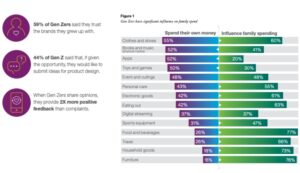
A Beginner’s Guide to Wireframing
A Beginner’s Guide to Wireframing Wireframing is an important step in any screen design process. It allows you to define the information hierarchy of your

How to market to Gen Z and young professionals in 2025 When considering the strategies to reach Gen Z audiences, it is essential to conduct thorough research and understand this demographic segment, so it does not become an enigma.
In case you are not engaging with Gen Z as a marketing demographic, chances are you are left behind. Even if you do not intend to focus on them, it is still admissible if a part of your consumer market is from Generation Z.
The purpose of this article is to provide information on what marketing to Gen Z lacks. From explaining who these young people are, to understanding what like and which apps or sites they visit, we have you covered. We will also provide invaluable insights on how businesses can meaningfully engage with Gen Zers through authenticity (since faking it does not work), effective social media strategies, and personalized marketing.
Gen Z refers to the cohort born from 1997 to 2012. They are unique in that they were the first to be raised in an era where digital environments were widespread. This sets them apart from other generations in terms of preferences and behaviors. For strugglers trying to sell something, getting Gen Z’s aid is invaluable if they want access to this large and powerful group of people who can easily make purchases.
Generation Z already makes up around 20% of the US population which means that any business interested in the future has to pay close attention to them. To deeply understand Generation Z and what is most important to them online or offline, one has to master the contexts within which they operate.

Given these opportunities, every business should start taking steps to reach out to this market. This guide can show you how.
Having been the first full generation raised in the online world, Gen Z has recently caught the marketers’ attention. Right from their early days, they were and continue to be surrounded by fast-paced and ever-changing tech that shapes the way they think and what they value. Gen Zers have firm beliefs about politics and social justice, placing high importance in self-identity and mental health.
With having such a complex mindset accompanied with unique values and beliefs, it is really important for companies who plan on catering to Gen Z to get their marketing approaches perfectly sculpted.
The generation commonly referred to as Centennials or Gen Z prioritize the well-being of the planet and have a myriad of passions they invest themselves in. More and more individuals are growing aware of issues such as climate change and social injustice, and so, supporting companies that share the same regard for these matters is very important to them. Supporting the preservation of the environment is one of their primary passions, and due to this, they are deeply committed to fighting against climate change.
Moreover, fighting climate change is not the only cause that Gen Z is zealous about; they firmly believe in diversity and inclusion as well and expect brands to advocate for those values as well. To fully capture the attention of youngsters, businesses must arm themselves with knowledge on what matters the most to the youth: sustainability, inclusiveness, and the desire to shift the focus to combating climate change.
Like Baby Boomers, Gen Z makes for a unique category of people which can be subdivided into. They hold pretty different views regarding owning a house. For example, earlier generations considered purchasing a home an important milestone in their life whereas Gen Z has a much different view and focuses more on experiences life has to offer. Due to this, they prefer to rent or live with others rather than purchasing house. There are several factors that contribute this such as tight finances, subpar jobs, and most importantly, the desire for unattached freedom.
When marketing to Gen Z, it is important to first comprehend the fact that their perceptions differ from other generations. As a result, communicating with them also has to be adjusted accordingly since everything is done differently now.
Understanding the nature of centennials is just as important in order to successfully formulate a segmentation targeting plan also meant for them. This way, detailed group targeting will help achieve better marketing results. Be sure to check out the following tutorials that will assist you in meeting these goals and objectives

A Beginner’s Guide to Wireframing Wireframing is an important step in any screen design process. It allows you to define the information hierarchy of your
The world itself for Gen Z is hinged on the digital space. Being the first generation to grow up with smartphones and social media, they have constantly been on the forefront while exploring the virtual realm. They don’t just view Instagram and Tik Tok as mere apps, rather a place to socialize and watch engagingly short videos.
With influencers leading the trends, Gen Zers like to mold around niches they are passionate about. Brands are now able to cater even better with the aid of newly created tools like AI voice generators and virtual influencers. These tools allow brands to create tailor made experiences which seamlessly fit into the digital-first culture of Gen Z. Allowing brands to interact and create content using unique real-time voices resonates with the innovative and fast paced culture of Gen Z.
Video games are also an area which have gained a soft spot for them. Besides the entertainment aspect, these games provide Gen Zers an opportunity to connect with people and feel integrated within a community.
Habits such as this have completely structured the day to include this habit, which means businesses now have no option but to step into this digital zone if they want to reach the customers.
| Platform | Key features | Content consumption patterns | ||
| TikTok | Short-form videos, trends, challenges | Gen Z users spend hours scrolling through TikTok content, often discovering new trends and challenges to participate in. | ||
| Visual content, Stories, Reels | Gen Zers use Instagram for direct messaging, sharing personal stories through Stories, and engaging with short videos through Reels. | |||
| YouTube | Long-form videos, tutorials, vlogs | Centennials consume long-form videos on YouTube, including tutorials, vlogs, and other content that provides in-depth information. | ||
| Podcasts | Audio content, storytelling | Gen Z is increasingly turning to podcasts for entertainment, education, and storytelling, often listening to podcasts while multitasking. |
Gen Z pays attention for shorter periods, which is why it’s imperative for brands to grab their attention fast. Fonts and content have to be ‘snackable’, visually appealing, and brands are required to work on their authenticity, humor, and creativity when it comes to communicating with Gen Z on social media.
Social media goes beyond simple entertainment for Gen Z; it is an integral part of their daily lives. It is a tool which they use to express themselves, seek guidance, and stay informed. They actively participate in the platform by following social media influencers, joining online communities, and freely expressing their thoughts.
To build a relationship with this generation, businesses need to understand that Gen Z uses the internet for social interaction and therefore, it is imperative to leverage social media effectively.

Marketing to Gen Z means understanding what excites centennials and using strategies that they’ll actually care about. Here’s how:
Building a rapport with the modern Gen Z consumer stems from authenticity and clarity. This demographic of younger people invests a tremendous amount of trust in brands that are perceived to be trustworthy and authentic. They expect brands to communicate what they believe in, how they conduct themselves, and how they choose to impact society and the environment.
It is critical to emphasize on trust when it comes to long-term brand loyalty. Businesses have to ensure that their marketing strategies are not just ‘between the lines’ because these will be put to the test. Due to the fact that Gen Z can see through issues of inauthenticity, brands that are not transparent risk losing their trust — as well as their business.
User generated content and social media influencers have a major influence on what members of Gen Z purchase and consume. Norms show that the younger generation is more influenced by their friends or their favorite influencers rather than conventional advertisements. This class of consumers is best captured by brands through influencer marketing and by motivating user generated content sharing. Connecting with influencers who understand the Gen Z culture gives companies terrific material that catches their eyes the right way.
To connect with Gen Z, marketers need to shape their messages in a way that clicks with what this group cares about and believes in.
A few tips to achieve this:
Gen Z is sensitive to social concerns and expects brands to lend support as well. Businesses that care about the environment, promote justice, and other matters of importance gain the attention of Generation Z.
Marketing that channels your brand’s purpose as a value proposition will resonate deeply with this generation and ensure enduring brand loyalty. Gen Z consumers are constantly in search of brands that embrace environmental sustainability, diversity, and social equity.
This generation has reached in a world full of personal branding. In every corner, it’s all about doing things differently and making them stand out which attracts Gen Z the most. Whether it’s a piece of clothing that one wears or it is the gadget that one owns, people of such a young age and this era wish to have a touch of uniqueness added to it which drives them and businesses to take such measures. Using flexible data algorithms, brands can also, in fact, tailor recommendations that accomplish and satisfy every person’s sole desires. After all, personal branding begins and ends with the consumer which makes it easier for Gen Z to relate to the brand and helps the brand establish a long lasting relationship with them.

For Gen Z, the way things look is very important when it comes to marketing. They really like TikTok videos and Instagram Reels because they’re fun and keep them interested. Companies need to use these sites to make cool-looking stuff that grabs Gen Z’s attention. Also, by keeping up with what’s trendy in design and adding bits that people can click on or interact with, businesses can really stand out and connect with Gen Z folks who love visuals.
The engagement trends of the new generation can be tasked to the excessive rise of platforms like TikTok and Instagram. Marketers pursuing Gen Z have the ability to endlessly capture their attention using engaging and stimulating videos.
When trying to capture the attention of Gen Z, it is important to understand how much they admire cool designs and concept. Individuals really appreciate items that leap to the eye and are in sync with their preferences.
With Generation Z being image conscious, they will most definitely go for things that appeal to them. Awesome colors, graphics and designs are sure to get their attention. Any brand that manages to nail this kind of style content has a very high chance of catching their interest.
Apart from the above mentioned factors these consumers are also looking to quench their thirst for something new and different. They tend to be very quick to pick up on the new tech or whatever is about to be the next trending thing. On the other hand, brands need to step up and such things will certainly score them some major points in the eyes of consumers because they need to catch up with the trends.
The basic adage? Getting where Gen Z is coming from in terms of design choices may just be the magic answer in creating content that is not only appealing to their eyes but surviving the battle in this world of magically advancing technology.

Being surrounded by technology throughout their lives, Generation Z appreciates interactions that fully immerse them. While engaging this generation, marketers should make use of contemporary features like augmented reality (AR) and virtual reality (VR) as they create lasting memories.
Connecting with Gen Z is incredibly diverse with the use of AR and VR. This audience can be effectively captured through gaming, virtual traveling, or narrative storytelling that they can actively participate in. These forms of engagement is capable of truly maximizing this audience’s attention.
Even Generation Z is now fully embracing augmented reality and virtual reality as they try new technologies. These tools allow brands to develop appealing experiences that attract younger, tech oriented audiences.
With the help of vr, one can enter an entirely virtual world. On the other hand, AR is a bit different in the way that it combines real life settings with computer generated elements. Both ways offer platforms through which companies to market their products to Gen Z, and do so in an engaging and innovative manner. Just envision throwing products in games or augmented reality tours where people can interact with the items; VR and AR make all of this super entertaining.
And speaking of games, they seem to dominate the popularity of AR and VR tools in Gen Z. The gaming industry has welcomed these technologies arms wide open and allows users to enter beautifully crafted worlds, all set for them to explore. This can help brands generate new synergies around gaming and leverage great new content made with AR/VR technology.
In coming up with strategies to capture the attention of Gen Z individuals, it is important for organizations to adopt a mobile-first mentality, since this demographic is usually on the move. To them, mobile devices aren’t simply a medium of connecting to the internet; they are an integral part of their daily reality. As such, they expect a certain degree of efficiency when engaging with the world. Whether it is searching the internet or engaging in shopping, Gen Z has grown accustomed to the idea of mobile versatility.
As such, businesses must ensure that mobile gadgets are compatible with their digital infrastructure, including websites and social media. Doing so permits and enables consumers to effortlessly switch between different platforms. Shea coupled to the existing social media accounts, easy installation may further enhance engagement with the brand to the rest of Gen Z.
More importantly, the approach that organizations need to take should not stop at improving the usability of digital outlets. An omnichannel strategy is critical in this case. By adopting this strategy, the transition from one channel or device to another is natural and intuitive.
Chasing effective marketing strategies for Gen Z is all about sifting through the data and making the appropriate tactical adjustments to what the Gen Z representatives say. Keeping track of KPIs is important to ascertain if the strategies implemented are effective, or if one needs to make changes.
For brands targeting this audience, it is important to engage with and understand Z’s consumption patterns in order to set appropriate KPIs. Such KPIs could include the number of people engaging with the content, the buying rate after exposure to the advertisement, the sentiment expressed towards the brand, and the amount of conversation generated on social media.
Moreover, monitoring how Z spends his time and formulating strategies while considering their opinion is crucial. Since this generation attaches great value to credibility, and the need to be transparent is also eminent among brands, those brands that listen and act to what the Z consumers need will have more brand loyalty from them.

According to a report by the National Retail Federation, 59% of centennials trust brands they grow up with. They also enjoy providing feedback and would like to get involved with product design.
When measuring success in Gen Z marketing, it is essential to track key performance indicators (KPIs) that align with Gen Z’s preferences and behaviors. Here are some KPIs to watch:
Leveraging social media analytics can provide deeper insights into these KPIs, helping you understand Gen Z’s engagement patterns and refine your strategy to resonate more effectively with this audience.
To keep up with the shifting marketing tactics, it is necessary to pay attention to what Gen Z has to say. The younger generations tend to focus more on being authentic, honest and forming actual bonds.
In order to know their standpoint, brands must and actively seek their viewpoints from social media conversations, creating surveys, or directly talking to them. Companies can use this and make informed decisions where there marketing strategy must be changed and improved to ensure a positive response from the Gen Z audience.
Besides making constant changes from the feedback provided, businesses ought to ensure that they stay abreast of the shifts in trends and technologies. Because the world that these young adults live in is evolving so quickly, brands that are able to adjust quickly, will have a better chance of engaging them.
To conclude, if you want to know how to adapt to Gen Z for 2024 and beyond, do not forget to figure out what they value on the internet. This particular group of tech-savvy individuals expect brands to be real, forthcoming, and most importantly, serve them.
Focus on saying things that resonate with their social issues and that are cool and trendy in design. Set up the necessary KPIs and adjust accordingly; it will surely help to gain their trust and have them coming back for more.
It’s all about being adaptive, innovative, and keeping abreast of the changes in technology if one intends to achieve a meaningful relationship with the younger generation as time progresses.
If you want guidance on developing a particular voice to fit your brand, try checking these guides first:

Connecting with contemporary working-class professionals and younger generations is not complex. Grasping the target market of Gen Z and having the buyer personas built will ease some of the brainstorming for new ideas.
Catering your marketing strategy towards them needs to be original, up to date, marketers need to be socially aware, and together with all these considerations, social media cannot be forgotten. The millennial group for your product will start getting interested. So how about we initiate marketing towards Gen Z now?
And since we are all aware that Gen Zers enjoy videos, let us figure out how to design a stunning video marketing campaign. This entire bundle provides guidance on many facets of video marketing, and is presented in such simplistic manner that even the total novice will be able to create a stronger video marketing campaign by the conclusion of the course. But in case one has already built confidence in video marketing, one will still uncover something novel in all the research, data, and case studies to assist one reach greater heights.
A Beginner’s Guide to Wireframing Wireframing is an important step in any screen design process. It allows you to define the information hierarchy of your design, helping you plan how you want your user to process the information. Wireframing is a vital component of the screen design process. It enables you to establish the information […]
Definitive Guide to Buyer Personas for Beginners Understand the useful techniques to develop your buyer personas. This is effective in planning the marketing strategy for your audience. In the game I Spy, the spy says “I spy with my little eye something with the color blue.” Then the players must guess what object the spy […]
How to market to Gen Z and young professionals in 2025 How to market to Gen Z and young professionals in 2025 When considering the strategies to reach Gen Z audiences, it is essential to conduct thorough research and understand this demographic segment, so it does not become an enigma. In case you are not […]